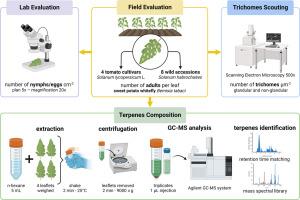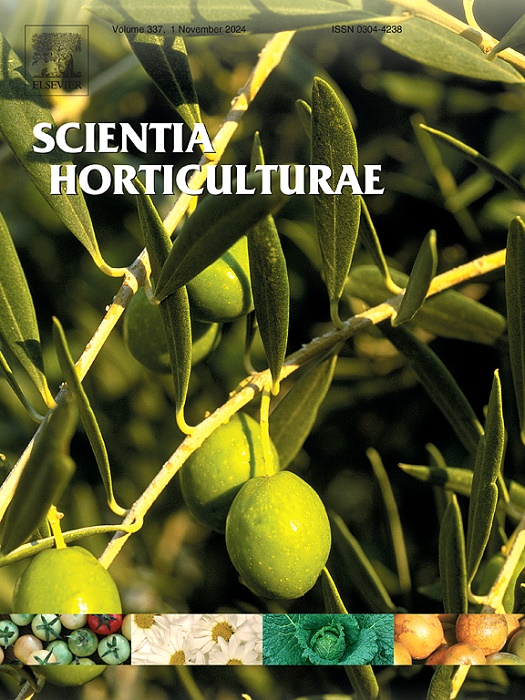野生番茄Solanum habrochaites品种对甘薯粉虱抗性的物理和化学特征描述
IF 3.9
2区 农林科学
Q1 HORTICULTURE
引用次数: 0
摘要
甘薯粉虱(Bemisia tabaci)是影响番茄生产的一种重要的世界性害虫,在取食过程中造成直接损害,并将多种植物病毒传播给番茄作物。为了保持番茄生产的盈利性,种植者需要继续研究改进甘薯粉虱的综合害虫管理(IPM)。本研究评估了八种野生番茄品种(Solanum habrochaites)和四种商业番茄栽培品种(Solanum lycopersicum)对甘薯粉虱侵扰的抗性。田间试验在奥本大学的 Wiregrass 研究与推广中心进行,该中心曾报告过蔬菜作物中粉虱的数量。通过减少昆虫数量的能力、腺毛的存在分析以及每个番茄品种的萜类化合物的概况和定量,评估了品种和栽培品种对粉虱的抗性。结果表明,野生番茄品种和商业番茄栽培品种之间的粉虱种群动态差异很大。野生西红柿品种的腺毛数量较多,萜烯特征明显,尤其是倍半萜,具有驱虫特性。多变量分析根据萜烯特征和毛状体类型确定了三个与粉虱抗性相关的群集。S. habrochaites PI127826、PI134418 和 G29258 的加入具有显著效果。与番茄栽培品种相比,它们能明显减少粉虱若虫的发育。小叶提取物的气相色谱-质谱(GC-MS)分析表明,S. habrochaites品种具有较高水平的倍半萜,包括α-zingiberene、β-caryophyllene和α-humulene,其中PI127826独特地产生了Ar-curcumene和9-hydroxy-zingiberene。研究结果突出表明,野生番茄中的S. habrochaites品种在育种计划中具有提高番茄抗粉虱能力的潜力,可为可持续的IPM计划提供支持。本文章由计算机程序翻译,如有差异,请以英文原文为准。

Physical and chemical characterization of wild tomato Solanum habrochaites accessions for resistance to the sweetpotato whitefly
Sweetpotato whitefly Bemisia tabaci is a significant worldwide insect pest affecting tomato production, causing direct damage during feeding and transmitting multiple plant viruses to this crop. Continuing research to improve integrated pest management (IPM) of sweetpotato whitefly is required to maintain profitable tomato production for growers. This study evaluated the resistance of eight wild tomato accessions of Solanum habrochaites and four commercial tomato cultivars of Solanum lycopersicum to sweetpotato whitefly infestation. Field experiments were conducted at the Wiregrass Research and Extension Center at Auburn University, where whitefly populations were reported in vegetable crops. Accessions and cultivars were evaluated for resistance to whiteflies through the ability to reduce the insect population, analysis of the presence of glandular trichomes, and the profile and quantification of terpenes of each tomato species. Results indicated significant variations in whitefly population dynamics among the wild tomato accessions and commercial tomato cultivars. Wild tomato accessions of S. habrochaites had higher numbers of glandular trichomes and distinct terpene profiles, particularly sesquiterpenes, known for their pest-repellent properties. Multivariate analysis identified three clusters based on terpene profiles and trichome types correlating with whitefly resistance. Accessions of S. habrochaites PI127826, PI134418, and G29258 had prominent results. They significantly reduced whitefly nymph development compared to cultivars of S. lycopersicum. The GC–MS analysis of leaflet extracts revealed that accessions of S. habrochaites had higher levels of sesquiterpenes, including α-zingiberene, β-caryophyllene, and α-humulene, with PI127826 uniquely producing Ar-curcumene and 9‑hydroxy-zingiberene. Results highlight the potential of wild tomato accessions of S. habrochaites in breeding programs to enhance whitefly resistance in tomatoes, which can support a sustainable IPM program.
求助全文
通过发布文献求助,成功后即可免费获取论文全文。
去求助
来源期刊

Scientia Horticulturae
农林科学-园艺
CiteScore
8.60
自引率
4.70%
发文量
796
审稿时长
47 days
期刊介绍:
Scientia Horticulturae is an international journal publishing research related to horticultural crops. Articles in the journal deal with open or protected production of vegetables, fruits, edible fungi and ornamentals under temperate, subtropical and tropical conditions. Papers in related areas (biochemistry, micropropagation, soil science, plant breeding, plant physiology, phytopathology, etc.) are considered, if they contain information of direct significance to horticulture. Papers on the technical aspects of horticulture (engineering, crop processing, storage, transport etc.) are accepted for publication only if they relate directly to the living product. In the case of plantation crops, those yielding a product that may be used fresh (e.g. tropical vegetables, citrus, bananas, and other fruits) will be considered, while those papers describing the processing of the product (e.g. rubber, tobacco, and quinine) will not. The scope of the journal includes all horticultural crops but does not include speciality crops such as, medicinal crops or forestry crops, such as bamboo. Basic molecular studies without any direct application in horticulture will not be considered for this journal.
 求助内容:
求助内容: 应助结果提醒方式:
应助结果提醒方式:


